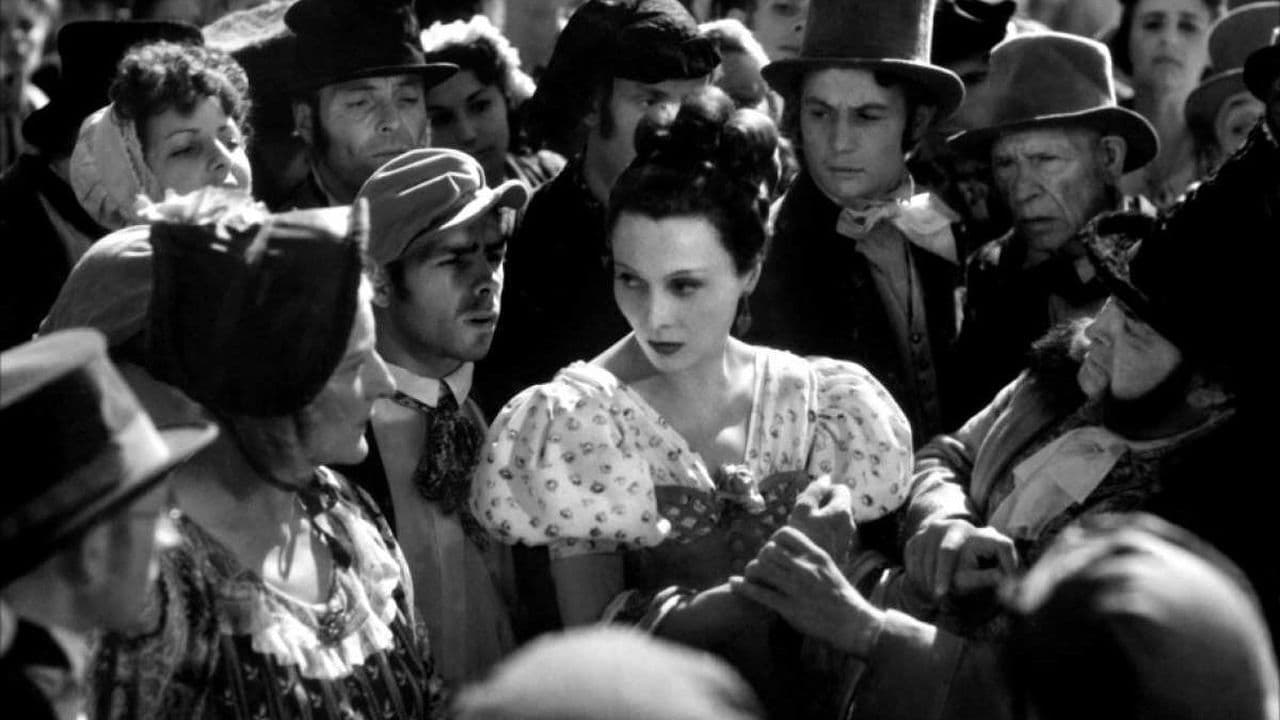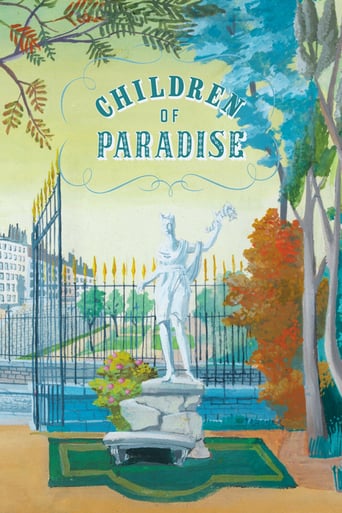

Wonderfully offbeat film!
... View MoreThe performances transcend the film's tropes, grounding it in characters that feel more complete than this subgenre often produces.
... View MoreIt's funny, it's tense, it features two great performances from two actors and the director expertly creates a web of odd tension where you actually don't know what is happening for the majority of the run time.
... View MoreThe plot isn't so bad, but the pace of storytelling is too slow which makes people bored. Certain moments are so obvious and unnecessary for the main plot. I would've fast-forwarded those moments if it was an online streaming. The ending looks like implying a sequel, not sure if this movie will get one
... View MoreThe movie opens and closes with a most festive carnival atmosphere, with mimes and clowns prancing their wares to an enthusiastic street crowd. Amid the rabble of 1920's Paris, a somewhat aristocratic looking woman becomes the romantic target for four disparate men, some with love in mind, and some with, well, that which goes with the territory. The story takes place over two long chapters titled 'The Boulevard of Crime' and 'The Man in White', and there was a bit of a disconnect for me in that the second part took place 'several years' after the introduction of the principal players. Perhaps that was necessary to establish that one of Claire Reine/the Lady Garance's (Arletty) principal suitors, the mime artist Baptiste (Jean-Louis Barrault) wound up in marriage to Nathalie (María Casares) and was raising a son with her. For whatever reason, Garance never terminated the relationships with her remaining three paramours, who remained in her orbit and often crossed paths with each other while harboring conflicting emotions.Though the picture managed to maintain my interest, I can't honestly say that this might have been the greatest French film ever, or as some reviewers here state, THE greatest movie of all time. Certainly director Marcel Carné created a lively and vivid period film under harsh wartime conditions while France was occupied by Nazis during World War II. It always strikes me as significant that actors and actresses can compartmentalize their emotions during times of stress to produce their particular form of art. Taking nothing away from devotees of the picture, I thought it was generally a good film but far from the 'greatest' label. With that said, I thought each of the principals did a competent job with their portrayals, particularly Jean-Louis Barrault during his mime sequences. I was somewhat puzzled over the choice of actress Arletty as the object of desire for her four would be lovers, as she didn't strike me as stunningly beautiful per se, though there was a classic grace to her personality. Most disconcerting for this viewer was how easily Baptiste managed to cast off concern for his wife when she caught the two of them in a romantic embrace. One wonders exactly what he would do about her if he managed to track down Garance in that vast sea of clowns and revelers as the story came to a close.
... View MoreNot living in a major city,the opportunities to watch classic films on the big screen become limited,with it being possible for a few years to go by without one getting shown. Aware of the "Cinema Time Machine" screenings held at The Electric Cinema in Birmingham, (the oldest cinema in the UK) I have sadly missed out on all the showings, due to not wanting to miss the last train home. A fan of auteur Marcel Carne,I was taken aback when looking at the Electric's listings and finding that they were screening Carne's epic (which I've never seen before) at a good time. This led to me finally meeting the children of paradise.View on the film:Raising the curtain on the 18th century, auteur director Marcel Carné takes his graceful stylisation of Film Noir's Port of Shadows and Le Jour se Leve to a vast costume Drama canvas. Sending every man to the siren-call like beauty of Claire Reine, Carné & cinematographer Roger Hubert make her stand out like a mirage in each frame,with Carné continuing to expand on his distinctive tracking shots,that run across the bustling streets of Paris, (the largest sets,and most expensive French film ever at the time)and find Reine in the middle of the crowd. Stepping out onto the stage, Carné reveals a surprisingly humorous side,where the mines at the Funambules theatre are played with a delicate touch highlighting the quirks in Baptiste's on-stage performances.Unveiled across the screen like an epic novel, the screenplay by regular Carné collaborator Jacques Prévert makes the 3 hour run time feel as light as a feather,by Prévert wisely focusing on the personal,rather than spectacle. Introducing Reine to four major lovers in her life, Prévert uses the figures to give the film four distinctive moods,as Baptiste's love twists from flirting Comedy to sweeping romance, Frédérick's jealousy spirals the title with a vengeful edge, Lacenaire's thieving glazing the brittle desire they each have for her and Count de Montray grips Reine with an unrelenting darkness. Made,but not landing until the Occupation was finally over, Prévert's poetic dialogue brilliantly goes behind the scenes of the stage,and radically connects the romantic tale with the allegorical,in each of the men having a possessive love,which surrounds Reine, until she drops each of them and gains (temporarily) liberty.Shining as the cast member whose become the most entwined in Prévert and Carné's legacy, Arletty gives a mesmerising performance as Reine,whose given a sophistication Arletty that gives her an unshakeable allure. Finding Reine held back from looking at the stage for a number of years, Arletty elegantly conveys the heaviness from the passage of time,with Reine's reunions of former lovers losing the romantic innocence they each shared. Duelling for Reine's affections with Marcel Herrand's devilish charms as Lacenaire,the stern glance Louis Salou injects Montray,and the flamboyance Pierre Brasseur dresses Lemaitre in, Jean-Louis Barrault gives a magnetic performance as Baptiste,whose mime stage shows Barrault plays with incredible ease,and expressively casts desire across Baptiste face,from seeing Reine in the crowd of the children of paradise.
... View MoreThere is no doubt that French cinema includes many of the world's finest, most influential and iconic films. From fantasy to neo-realism, historical epic to kitchen sink drama, and with arguably the most important cinematic New Wave to add to its canon, French masterpieces can be found in almost every genre imaginable; indeed, in many cases, they have helped to distinguish between them.'Les Enfants du Paradis' is considered the finest product of the partnership between director Marcel Carné and writer Jacques Prévert. At over three hours, and split into two parts, the film follows a handful of colourful characters through the 1820s and 30s in that fascinating, mystical city: Paris. The focus is on the Parisian theatre – a place of hypocrisy, deception, exaggerated emotion, corrosive artificiality, cheap tricks and crude laughs. With an astonishing attention to detail, and displaying a perfect mastery of his medium, Carné exposes with scorching wit the superficiality of society and the damaging effect it has had on his characters. There is a fine line between fantasy and reality, and the characters, sometimes without even knowing it, deceive themselves and the others around them. In a film with so many grand themes, its tragedy lies in its profound exploration of love, and what happens when genuine emotion attempts to shine through in a world of romantic, sentimental lies, cruel falsehoods, deluded pride and vicious crime.Much of the brilliance of this film I cannot divulge in my review. I admit, that aside from its considerable critical acclaim, I knew nothing about it when I bought my ticket. That is the way it should be seen: let its delicious melodrama, breathtaking sets, classy cinematography, dry comedy and poignant tragedy wash over you. Long it may be, but the time flies by; very rarely have I been taken on as deep and enjoyable a ride as this one – and how refreshing that is, considering that those two adjectives seldom gel when talking about cinema. Even more impressive is that with so many characters, story lines and themes at play, the movie never once feels rushed or convoluted: its pacing is pitch perfect, and its artistic vision - impeccable; the denouement is abrupt and delivers a memorable emotional punch to the gut.This is a timeless film for all tastes: those who like a great plot, a compelling love story, lavish costumes, profound thematic material, passion and grand emotion, an insight into a different culture or a different time and place – this has everything, encompassing all of life – from the most pitifully poor to the most disgustingly rich. I personally cannot wait to see it again, and the newly restored version released recently by the BFI is definitely the way to go if you have the intention of watching it – the print, much like the film, is a joy to behold, almost doing full justice to the amazing cinematography (courtesy of Marc Fossard and Roger Hubert) and the delightful technical and stylistic flourishes found within it.I am not exaggerating when I say that this may well be one of the finest films ever made. It could be studied and analysed until the cows come home, but as is often the case for many truly great films, there is nothing quite like seeing it for the first time and just enjoying it for what it is, not feeling the need to try and analyse because you have complete confidence in the filmmaker and are utterly captivated by the story he is telling you. It was made over sixty years ago now, but it could have been released yesterday for the first time. It feels as fresh and exciting as ever - and that, for me, is the sign of a film to cherish!
... View MoreIt's funny how the French have always kept on making makes like this throughout the years and still have a sort of monopoly on these type of movies this present day.It's a movie about one of the oldest and most eternal themes; love. It's not really an happy movie about love though and the movie is filled with characters who are all longing for their true love, while they due to the circumstances of life, are stuck with others. This theme and concept also raises a whole lot of other themes in the movie such as jealousy, envy and just blind hate.It's a really fine made movie, that also truly is beautiful looking. Once you start looking more into the movie you'll notice and appreciate more the movie its camera-work and also good quick style of editing, in which the French always have been pioneers at.It's a French period piece, so you can expect lots of god looking costumes and silly looking haircuts. It's all grand and also expensive looking, which is quite amazing actually, considering that this movie got made in Nazi-occupied France at the time. Must have also been one of the reasons why production for this movie lasted 18 months., which especially for those days was extremely long for any sort of movie.It's a movie that centers around its many characters, which means that the actors are given plenty of room to give some powerful and impressive performances. The movie does really feel like a Shakespeare play at times, also since Shakespeare's plays themselves play an actual role in the movie.The movie gets better as it more and more starts to progress. Caling this movie therefore overlong is a bit uncalled for, even though with its over 3 hours of running time it's still a long movie of course. The movie however is a two parter and I also wouldn't be surprised if these two parts also got shown separately at its initial release.9/10http://bobafett1138.blogspot.com/
... View More